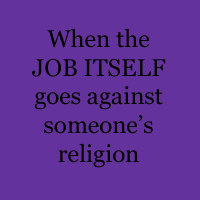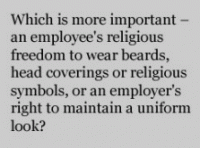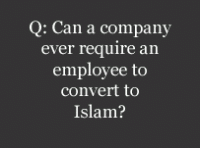MINNEAPOLIS--For religious reasons, a woman insists on wearing a button depicting an aborted fetus to work.
A member of the Church of Body Modification claims religious discrimination because of her company's policy against visible piercings and tattoos.
A man refuses to sign his company's diversity policy because he says it crosses the line from promoting respect into actually endorsing homosexuality, which goes against his religious values.
All these cases have tested the limits of religious accommodation in the workplace. This nation guarantees freedom of religion, but where is the line drawn?
When does freedom to proselytize, for example, cross the line, becoming harassment?
These issues are coming up more frequently in the United States; the number of annual religious discrimination complaints has risen nearly 50 percent over the past 10 years, according to 2006 statistics from the Equal Opportunity Employment Commission.
Michelle Weber, assistant program director for the religious diversity in the workplace program at the Tanenbaum Center for Interreligious Understanding in New York, said the current social and political climate plays as much of a role in the increase as the changing demographics and the influx of immigrants from a wider variety of religious backgrounds.
"We have a lot of leaders who are very open about the fact that their religion is important to them," she said. "If the President is bringing what he believes to his job every day, it leads people to maybe be a bit more vocal."
The Law
Under Title VII of the Civil Rights Act of l964, a company that employs 15 or more people must reasonably accommodate employees' sincerely held religious practices unless doing so would impose an undue hardship on the employer.
But the meaning of "reasonable accommodation" and "undue hardship" are up for interpretation.
It's hard to generalize what makes an accommodation qualify as "reasonable," according to Lynn Kappelman, an attorney with the Boston-based firm of Seyfarth Shaw who specializes in labor and employment law.
"You have to look at the size of the company, the cost of making the accommodation, whether there are other accommodations which are less burdensome that could be made," Kappelman said. "We're balancing the needs of the business with the needs of the individual, and because of that it's different in every situation."
Different judges may have different opinions on the same case, she said. "What is or is not a reasonable accommodation is in the eye of the beholder."
In the case of the aborted fetus button in Nebraska, the courts ruled that allowing the woman to wear the button but keep it covered was a reasonable accommodation; this respected her right to wear the button while also respecting the rights of her co-workers to not have to look at it.
Similarly, in Massachusetts, the accommodation of allowing the Church of Body Modification member to cover her piercing with a band-aid or wear clear, less noticeable piercings was ruled "reasonable."
In the case of a New York man who wanted Sundays off because the Sabbath is supposed to be a day of rest, a lower court said it was a reasonable accommodation to schedule him on Sunday afternoons but give him Sunday mornings off for church.
The New York-based 2nd U.S. Circuit Court of Appeals reversed this decision, however, saying it did not "eliminate the conflict between the employment requirement and the religious practice."
Other employees requesting Saturdays or Sundays off for religious reasons have been transferred to lower-paying or part-time positions. Though this type of accommodation may not seem "reasonable" from the perspective of the worker, it has generally been upheld by the courts -- which have also held that companies are not required to offer the employee's preferred accommodation, merely some accommodation that is "reasonable."
A company doesn't need to accommodate religion at all if it can show that doing so would cause an "undue hardship."
For example, a 1977 U.S. Supreme Court case established that violating a collective bargaining agreement constituted an "undue hardship"; in order to give an employee Saturdays off for the Sabbath, the company would have had to force employees with more seniority to work those shifts.
In another case, a Tennessee court ruled that it was an "undue hardship" for one company to let 40 Muslim employees break for evening prayers, as it would have required the company to shut down its production line.
Courts in Boise, Idaho, said Hewlett-Packard did not have to accommodate an employee's need to put up large posters in his cubicle with scriptures condemning homosexuality because the posters were visible to other employees and thus violated the company's anti-harassment policy.
The Workplace Religious Freedom Act
The "undue hardship" standard in religion cases is much softer than the standard for accommodating people with disabilities. For a company to avoid accommodating an employee with a disability, said Kappelman, "you have to show significant expense to the company... a real deleterious effect on the needs of the business."
But for religious accommodation, a 1973 Supreme Court decision established that a company does not need to accommodate a religious practice if it can show that doing so would have a "de minimis" cost to the company.
Some feel decisions like this have chipped away at the original intent of the law.
"As it stands right now the employer doesn't have to do much," said Todd McFarland, associate general counsel for the Seventh Day Adventist Church. "If any employee asks for an accommodation obviously there's going to be some expense. For instance if [taking a religious holiday] would require somebody else to work overtime and they'd have to pay at a higher rate, then most courts have held that's a de minimis expense and the employer wins."
In 1996, Sen. John Kerry (D-Mass.) proposed the Workplace Religious Freedom Act, which would require employers to make "an affirmative and bona fide effort" to accommodate religion and which would define "undue hardship" as "requiring significant difficulty or expense," in contrast to the current "de minimis" standard. The bill has been reintroduced every year but has never passed, though it has gathered supporters on both sides of the aisle.
Civil rights groups like the American Civil Liberties Union have said the bill is too broad and would allow people to proselytize at work, harass gay and lesbian co-workers, and refuse to perform essential job functions like dispensing birth control pills or defending abortion clinics. The ACLU has proposed a narrower law that would bolster accommodation requirements specifically for religious holidays, apparel, beards and hairstyles.
"[The Workplace Religious Freedom Act] is drafted in such a way that it may in fact while trying to accommodate the religious practices of some people actually lead to discrimination against other people, and that's a real problem for us," said Sammie Moshenberg, director of Washington operations for the National Council of Jewish Women, which is the only major Jewish group to oppose the act.
But supporters of the bill dismiss these concerns.
"I don't know that the courts have ever found civil rights law as giving, you know, a ticket to harass other people," McFarland said. Even though the majority of religion cases do involve issues of scheduling or dress, he said it wouldn't be fair for the law to favor certain types of religious beliefs and practices over others; all religions should be protected equally.
On the other side of the argument, Philadelphia-based labor and employment attorney Jeff Pasek said we shouldn't elevate religion over other concerns at all.
"Suppose the guy who works next to you says, 'I'm divorced and I only get to see my children on the weekends, and my Friday night, Saturday time is very important to me'?" Pasek asks why that should be given less legal weight than a request for time off to observe the Sabbath.
"Is your religion more important than [his] secular reasoning?"
But there is a trend in business to embrace not only religious practices but also secular aspects of employees' lives and to try to help workers find balance between their job and their outside lives.
Stewart Friedman, director of the Work/Life Integration Project at the University of Pennsylvania's Wharton School, said having a more flexible, personal work environment helps companies attract and retain better people, and also makes employees more productive while they're at work.
"Over the last 20 years it's become a growing issue, and over the last five it's become a legit business issue," he said. "People who are better able to incorporate all the different parts of their lives are generally healthier and more energetic and focused."
Regardless of whether the law changes, the issue of religious accommodation in the workplace is becoming more and more high-profile and is unlikely to go away.
Ibrahim Cooper, a spokesman for the Washington-based Islamic rights and civil advocacy group the Council on American-Islamic Relations, says the number of workplace complaints from Muslims has been going down "as companies have become educated about the existing law."
He said CAIR doesn't have a problem with the law as it is currently written; "we just need the corporations to follow it."




 Print
Print Bookmark
Bookmark
